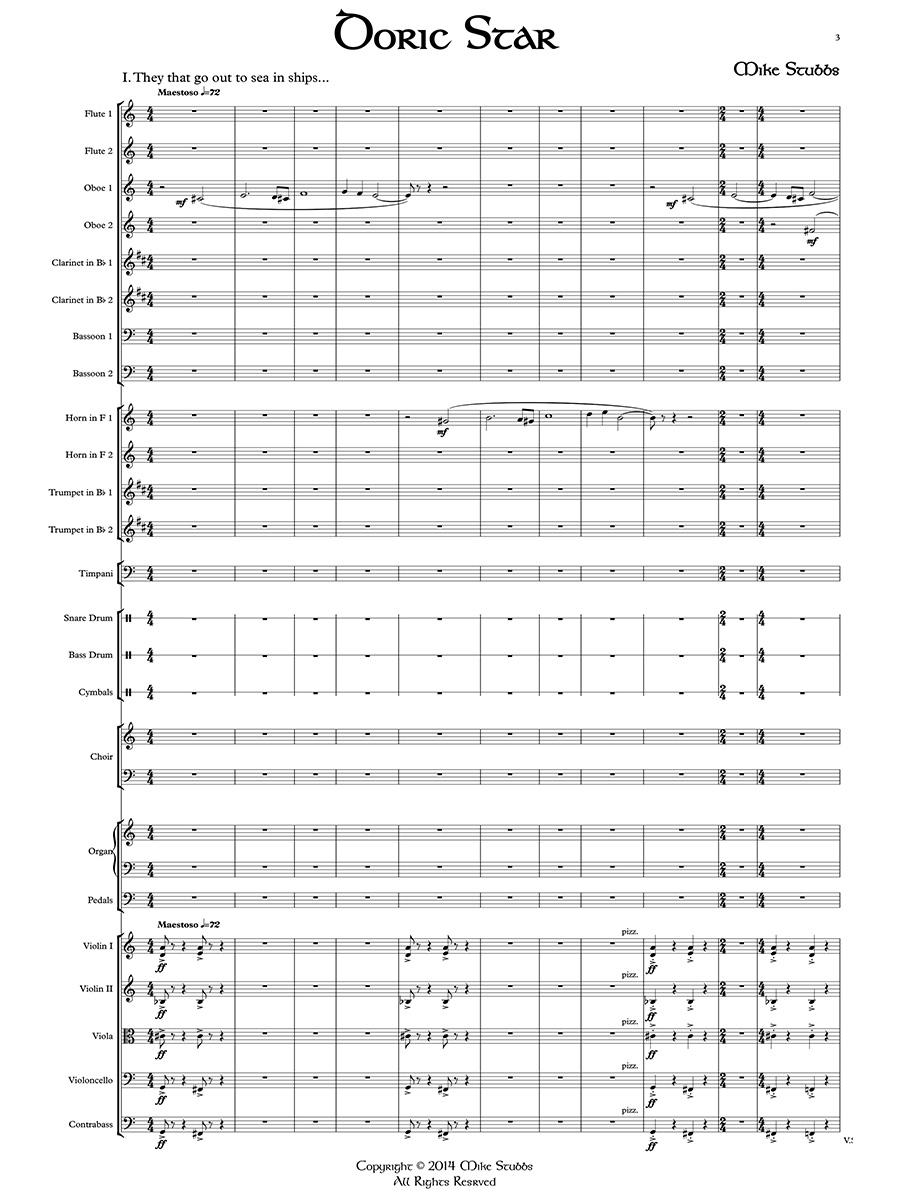Doric Star for chorus and orchestra (first print)
Stubbs, Mike
16,00 €
Preface
Mike Stubbs
Doric Star
For chorus and orchestra
(b: Liverpool, 1 January 1971)
Mike Stubbs studied composition with John Moseley at St. Edward’s College, and later with Simon Holt at The City University in London. His work covers a wide range of genres from solo instrumental works (particularly for Church Organ) through a number of works for chamber ensembles to orchestral works such as Doric Star. He has also written a variety of church music, reflecting his involvement with both his local parish and the Cantata Choir of Liverpool Metropolitan Cathedral.
Since 1995, he has worked as a primary school teacher, in the process writing several works for children, including a fully staged musical, ‘The Curious Case Of La Fleur Perdue’ (2000). In this area, he now works with his wife Gail, looking to produce music for children to sing that is as sophisticated as the commercial music that they are accustomed to listening (and singing along) to.
In 2011, a recording of his ‘Fanfare: Once Around, Anticlockwise’ for organ (2010) received excellent reviews from the music press: ‘Mike Stubbs’s fanfare…strikes a note of originality’ (Choir & Organ Magazine, March/April 2011); ‘The album’s most illuminating track…electrifying’ (Organists’ Review, May 2011).
Composer’s notes on Doric Star
Doric Star was written to commemorate the 75th anniversary of my Grandfather’s involvement in one of the early successes in the struggle to keep open the supply routes to Britain during the Second World War. British merchant navy ships were being picked off by the pocket battleship Admiral Graf Spee, which would then vanish before any counter attack could be mustered. On 2 December 1939, the ship Doric Star, captained by my Grandfather, William Stubbs, was attacked. Under extreme pressure and threat, the Doric Star managed to send out a vital mayday message that told the Admiralty of the battleship’s whereabouts and gave enough information to allow those in command to plot an intercept course. This led directly to the cornering of the Graf Spee in Montevideo harbour, the release of its prisoners and the ship’s scuttling by its commander, Kapitän zur See Hans Langsdorff.
The music is divided into five sections:
* They that go out to sea in ships…
* It was a calm day
* Mayday!
* Pulling the wool over the enemies’ eyes
* For those in peril on the sea
The first section introduces the main theme and quotes Psalm 107:23 & 24: ‘They that go out to sea in ships/That do business on great waters/They see the works of the Lord/And his wonders in the deep’.
The next three sections are inspired by the events that unfolded that fateful day. First of all, the horn then trumpet plays the theme over a whispering accompaniment in the strings and woodwind, signifying the calm but tense conditions that preceded the attack. This builds through to a climax which leads to the second section, ‘Mayday!’ This is a highly rhythmic section, built upon the morse code for the word ‘Mayday’, with a counter from the brass based on the message from the Graf Spee, ‘Stop or we fire’.
The final of these three sections is inspired by my Grandfather’s stubbornness in the face of his interrogation (represented by the trumpets and clarinets) and the sleight of hand by which the interrogators were led to believe that the Doric Star was carrying a cargo of wool – no use to the enemy – when it was actually carrying vital meat and dairy supplies. This part ends with a flurry of activity to leave the ship before a series of crashing chords signify the Doric Star’s final sinking by the Graf Spee.
The piece concludes with the hymn Eternal Father, Strong to save. This is initially quiet and distant, as if being sung by the congregations of churches thousands of miles away in crew members’ home towns. The music swells, bringing the prayer to present day and asking God to keep safe all those who, like my Grandfather and his crew, face the uncertainty of life at sea.
Doric Star was first performed on Saturday 22 November 2014 at the Metropolitan Cathedral of Christ the King, Liverpool, by the Cathedral Orchestra and Cantata Choir, conducted by Stephen Pratt.
Phillip Brookes, 2016
For performance material (including vocal scores) please contact Musikproduktion Höflich (www.musikmph.de), Munich.
Score Data
| Score No. | 1802 |
|---|---|
| Special Edition | The Phillip Brookes Collection |
| Genre | Choir/Voice & Orchestra |
| Size | 225 x 320 mm |
| Performance materials | available |
| Size | 225 x 320 mm |
| Piano reduction | available |
| Printing | First print |
| Pages | 40 |
